Communicating Christ in a Multicultural World
5. Introduction to the Cults (i)
Lesson Objectives
Understand what the main "Christian-offshoot" cults teach, how people are drawn to them, and how to reach followers with the Gospel.
Understanding the Cults
Framework for Studying the Cults and Major Religious Systems in the Course
- Historical Background
- Principal Beliefs and Meanings
- Christian Responses to Tenets
- Reaching Adherents with the Gospel
Assumptions We Need to Make
- Deception of the cults is real, but our stereotypes may not be
- The Holy Spirit is able to break deceptions & "false imaginations" in peoples' lives (2 Corinthians 10:3-5)
- God can use us to bring people to a personal knowledge of Jesus Christ
- Our "weapons" are not human arguments but spiritual authority
DEFINITIONS:
Cult: Latin "cultis" - all that is involved in worship, ritual, religion, emotion, liturgy.
In some countries, means a church service, as distinct from Mass (eg Spanish "culto" evangelical meeting).
Vernacular meaning = bizarre religious group
- door knocking "religious salesmen" - focus on world conditions, family break-up, etc., magazines (Plain Truth; Watchtower, Signs of the Times, Awake)
- newspaper articles, parents alleging children brainwashed/disappeared
- mass suicides, or possibilities (eg Jim Jones, Heavens Gate, Branch Dravidians)
- alternative lifestyles, escapism, new therapies
- police raids, court involvement (eg The Family, or Children of God)
- "Messiahs", gurus (Shree Rajneesh, Maharishi,), spiritual healers
Social scientists define cults as groups that deviate from cultural norms.
Our Definition: any group or belief system that deviates from Biblical, historical Christianity. Some cults exist within the Christian sphere; others are associated with religious systems, eg
- "Christian" links with KKK,
- Non-Christian (eg Aum Supreme Truth)
Many people do not classify New Age beliefs as part of cult system. but the same category.
Read:
- Matthew 24:23-24 - false Christs, prophets will abound in the last days
- Timothy 4:1-2 - false teaching, deceiving spirits, things taught by demons in the last days
- 2 Corinthians 11:13, 14 - false apostles ... deceitful workmen ... Satan himself as an angel of light
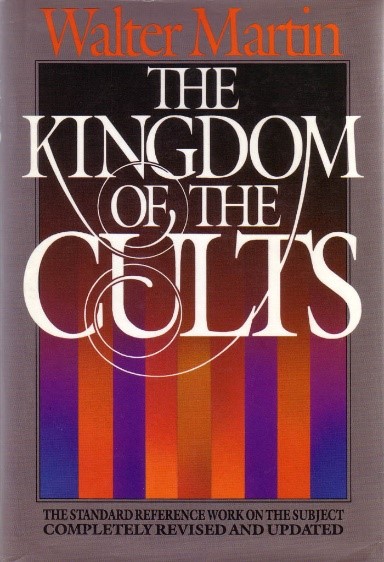
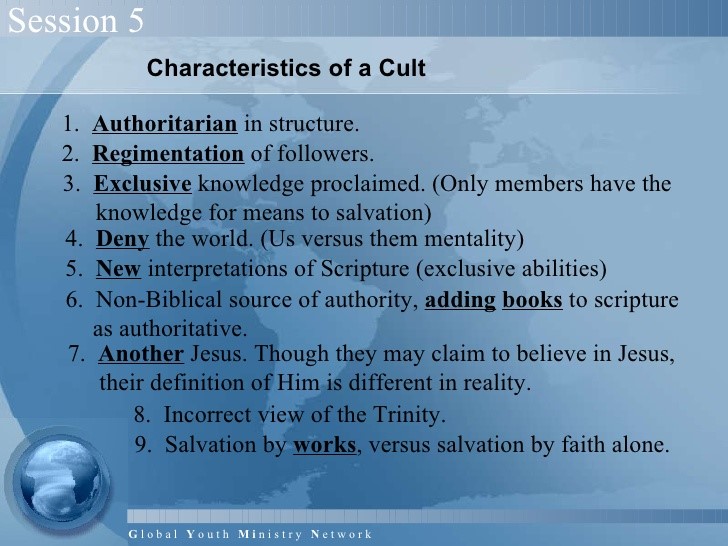
Why Do People Join Cults?
- Strong teaching emphasis - want to follow people who know what they are doing and what they believe. The major cult groups emphasise knowledge, training, application of belief
- Leaders are visible, charismatic, authoritative, able to be "touched"
- Personal needs - spiritual hunger; search for people who care; need to feel part of a group (including being dependent on it); desire for support
- Under pressure (broken relationships, feelings of loneliness, social group pressures, facing major decisions)
- Membership gives sense of mission, purpose, security, uniqueness, satisfaction.
- Fear - of what is happening in the world
- Naivety
- Rejection of traditional authority structures
- Disaffection with traditional Christianity
- Liberalism in the Christian church - no absolute truth; lending to a vacuum of' belief
- Spiritual abuse in churches
- Hope for the future (including eternity)
- Spiritual delusion - Romans 1:21; 2 Thessalonians 2: IO-12

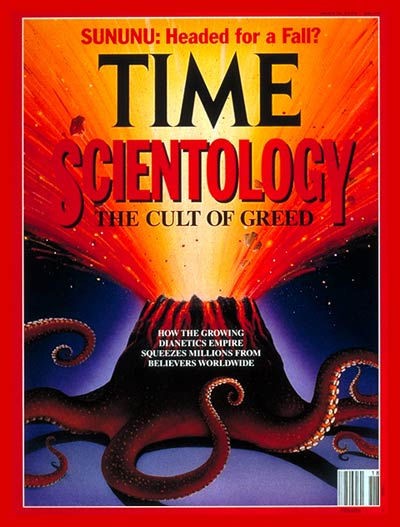

Cults typically look for people who are:
- intelligent
- idealistic
- well educated
- economically advantaged
COMMON CHARACTERISTICS OF CULTS
"Old" and "New" cults share basic characteristics (however great variety). Most cults:
- have a different Jesus; a different Gospel; and a different Holy Spirit (2 Corinthians 11:4; I John 4:3)
- are comprised of people who simply, "do not receive the love of the truth, so as to be saved" - 2 Thessalonians 2:10
- deny the God of the Bible - Jude 4
- reject the atonement - 2 Peter 2:1
- deny the power of godliness - 2 Timothy 3: I-5
- reject sound doctrine; replace with fables - 2 Timothy 4:3-4
- reject spiritual authority Jude 8.
Adding and Subtracting
- add to the Word of God- often with a book of their own (the Bible is ignored, or members are taught they need new revelation, teachings, to understand it)
- subtract from the revelation and Word of God (subtract from solid teaching and from the simple faith teaching that underpins Christianity)
- add new requirements for salvation, including essential belief regimes and works
- subtract from the glory of God by elevating man to godhood
- add new interpretations, emphases, applications

Key Characteristics
| Leadership |
- Leaders claim an exclusive ministry, revelation or position of authority, often "given by God"
- Members look to leaders for guidance in all they do, including personal decisions (marriage, career).
- Claim they have no clergy, paid ministry or priests' "all are equal".
- Emphasise obedience, submission. Criticism is seen as rebellion against authority.
|
| Uniqueness |
Believe they are the "only true church" (or the restored church), with the only "genuine" revelation/s; the only valid dates for the future (eg the return of Christ, Armageddon).
Only those who are prepared to be strong, committed members are admitted to the group; sometimes only after a period of testing; do not want people walking away.
Nevertheless, most cults are actively evangelistic (some make proselytization a condition for membership).
Dissent or questioning of the group's teaching or leadership is discouraged. Personal views and free will are subsumed for the sake of unity in the "group". Unquestioning attitudes are seen as ideal. Loss of identity follows.
Relationships with friends, family, spouses, children, parents, etc are broken off, or curtailed. Family members often say they no longer recognise the person.
"Us" verses "them" mentality. Leads to isolation from the community in general. Outsiders are seen as belonging to the devil. Enemies can be: former family and friends, government, media, education systems, hospitals, churches.
Persecution common - some welcome opposition as persecution and evidence of "martyr" status; others withdraw. Paranoia leads to belief that "others" are trying to take over the group
|
| Attitudes to Mainstream Churches |
Critical towards other churches. Self-righteousness characterises the cult member, who rejects all questioning but feels free to judge the beliefs of others.
|
| Membership |
Use manipulation to keep people in their ranks, including threats of divine punishment, loss of reward, being shunned by family members) and friends.
Great emphasis on loyalty to the group and its teachings. Members' lives are totally absorbed. Little time to think for themselves, often because of physical & emotional exhaustion.
Total control over the private lives of members, eg through communal living, reporting on one another (in the guise of ensuring group stability and protecting against "the enemy").
Attempts to leave are met with threats. Some groups insist on pledges, oaths of secrecy. Others feel intimidated by oaths they have taken. Those who leave are coerced back into the group, or shunned altogether.
|
| Financial Support |
Members are expected to give substantial financial support to the group, eg signing over their property; buying magazines, books and tapes; giving significant amounts of their income to the "ministry".
However, little accountability exists for those funds.
At the same time, publicly deride churches that take up tithes and offerings, inferring they do not do this.
|
| Personal Lifestyles
|
Members are often required to give up medical treatment, jobs or family relationships in the name of "faith".
Regimentation of lifestyle is common. Guilt comes from infringing even minor rules.
Cult members lose their ability to function as members of a broad society, make decisions for themselves and relate to those who do not live the way they do. Their lives come to be revolved around the cult.
|
|
Beliefs |
Members are made to feel guilty for what they did before joining the group, and grateful for being accepted, forgiven and allowed to participate in the "elect" destined to enjoy "deeper" understanding of the true meaning of existence, and (in some cases) eternal life to follow.
Many beliefs are attached to spiritualistic practices, eg angels, spirits, automatic writing, contact with departed loved ones.
Belief systems based on new (or "restored") meanings of familiar Christian concepts, eg God, Christ, Holy Spirit, salvation, rebirth, heaven, hell, meditation.
|
Categories of Cults
| Religious Cults | Therapy Cults |
|---|
| Communal living common | Communal living rare |
| Average Age at point of recruitment is in the 20s | Average Age at point of recruitment is in the 30s |
| Registered as "religious" groups | Registered as "non-profit making" groups |
| Appear to offer association with a group interested in making the world a better place via political, spiritual or other means. | Appear to offer association with a group giving courses in self-improvement or self-help techniques or therapies. |
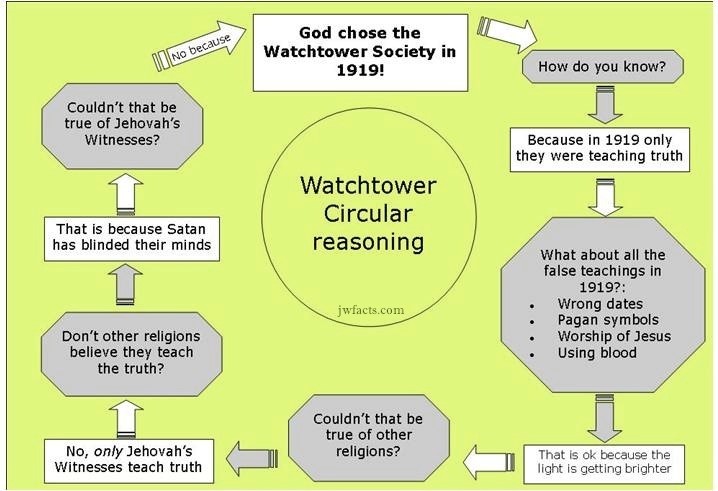
Responses to Cults
- Direct peoples' allegiance to Christ alone (I Corinthians 7:23).
- Be aware of Biblical truth, so that you can make sound evaluations.
- Reject the underlying message, even if it appears to come an "angel from heaven" Galatians I:8.
- Depend on the Holy Spirit to give the revelation of Jesus Christ (l Corinthians 12:3).
- Minister in the power of the Holy Spirit to the needs that led them to engage the cult in the first place (cf Paul in Ephesus. Acts 19:10-20).
- Pray for them.
- Be prepared to reason with them (Acts 17:17)
- Do not attack them; create walls to communication.
- Educate yourself in the area of cult mind control techniques, through books and seminars. Talk to former members of any cult group, as many cult techniques are similar.
- Enlist the help of others, either professionals in the field, or by educating friends and family members and soliciting their support. Long-time friends of the person, who are believing Christians, are the most often effective.
Jehovah's Witnesses
Also known as:
- Jehovah's Christian Witnesses
- Millennial Dawn (original name)
- Watchtower Bible and Tract Society
- People's Pulpit
- International Bible Students' Association

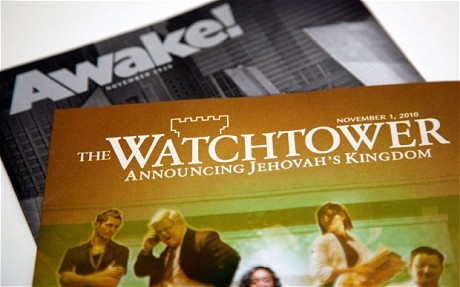
Historical Background
Founded in the 1870s by Charles T Russell. Russell had studied oriental religions. Wrote six volumes, "Studies in the Scriptures" which he claimed were essential to understanding the Bible. Succeeded by Judge JF Rutherford (WTS lawyer) in 1916. Officially called Jehovah's Witnesses since 1930 ("Witnesses" from Isaiah 43:10). Rutherford's intention was to set the organisation apart from rest of those who called themselves "Christians".
Current Status
Accurate numbers are hard to come by.
Several years ago, the group claimed a worldwide membership of more than 8.2 million adherents involved in evangelism, convention attendance figures of more than 15 million and an annual Memorial attendance of more than 19.9 million. ("Guided by God's Spirit", Awake!: 32. June 2008).
Growth figures vary greatly from one country to another. Stagnant in most of Western Europe; growing in Eastern Europe; virtually none in India, China or Muslim nations.
Under direction of a Governing Body of 13 men in "Bethel", Brooklyn, NY. This group is considered the "faithful and discreet slave" with sole rights to interpret the Bible.
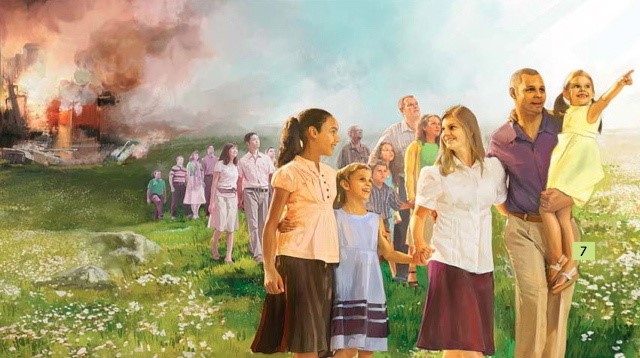

Comparison of Beliefs
Errors focus on (i) the person and work of Christ; (ii) the doctrine of grace as relates to salvation; (iii) the future.
| Subject | Jehovah's Witness Belief | Evangelical Rebuttal |
|---|
| God's Name | God's name is Jehovah. Christians are in error for not calling Him Jehovah.
| God's name in Hebrew is Jehovah. - Psalm 83:18.
The most common vocalization of the tetragrammaton (YHWH) used in the Hebrew Scriptures. Ancient Hebrew had neither vowels nor J or V. Translated as "LORD" in most Bibles.
"Jehovah" was a Hebrew word. If Witnesses wish to be consistent, they should be "I Am Witnesses", with "I Am" in all English verses.
|
| Jesus Christ
| Jesus was a created being -just one of the gods (Michael the Archangel in his pre-human state).
At His Baptism Jesus was anointed to become the Messiah.
Jesus abandoned His spiritual nature when he came to earth, and left his human nature behind when he left the earth. He is now simply a spiritual being of a higher order than before.
New World Translation (30 languages) version of John indicates, "the Word was a God"
"Jehovah's Witnesses believe God is greater than Jesus (and) do not believe that Jesus is equal with the Father, as the Trinity doctrine says... created by God and subordinate to Him."
Deny Biblical resurrection: "His body may have dissolved into gases, or it may be preserved somewhere as a memorial. No one knows" (Russell). "God raised him as a mighty immortal spirit Son ... a divine spirit creature. "
| No Scriptural evidence of Archangel claim.
Hebrews 1:2; 1 Timothy 3:16 Colossians 1:16, 17.
If Christ were not divine at His death He could not have brought about atonement -
1 Timothy 2:5; Acts 1:11; 1John 1:7; Hebrews 10:11-14; Revelation 1:5, 6. God has exalted Jesus and given Him a name above all other names - Philippians 2:9-
John 1:1-3 - no "a" before "theos".
Jesus and the Father are One
Numerous Biblical references, eg the Jewish leaders sought to stone Jesus because he claimed equality with God (John 8:59; 10:31-33).
Jesus emphasised that it was himself when he appeared to the disciples - John 20:27-29. Without believe in the resurrection of Christ we have no basis for salvation - Romans 10:9, 10; 1 Corinthians 21; Luke 24:39; John 20:27, 28
|
| The Holy Spirit
| The Holy Spirit is God's Active Force, not a person.
| The Bible teaches that Holy Spirit is a Person. He demonstrates personality traits and functions, eg mind, will, feelings, knowledge. teaching, witnessing, interceding, revealing, speaking, leading. forbidding. giving permission, being insulted, being lied to, being grieved, being blasphemed.
|
| The Second Coming of Christ
| The second coming occurred in 1874, though Christ is visible now only through faith.
| The Bible teaches a physical, literal, visible return of Christ - Acts 1:11; 1 Thessalonians 4:14-17, after which Christians leave the earth.
|
| The Future of the Elect
| Salvation comes through good works.
God has given up on Israel and the Jews. The 144,000 mentioned in Revelation 14: 1-3 are people resurrected to rule with Christ in Heaven. They are Christ's "Little Flock"; 135,400 in 8,600 are still living (the composition of this elect group is fluid, as dis-fellowshipped members are replaced from time to time). Non members are known as the "other sheep" (including Old Testament saints).
He who believes on Jesus Christ does not have everlasting life now, but only has it at a future time. "One cannot be born until he has been raised from the dead". Sanctification is the result of works. the result of our consecration and self-sacrifice.
Teach non-existence of the soul after death.
| Salvation is not of works - Ephesians 2:8-10.
The context of the Revelation is clearly that the 144,000 are Jews (with 12,000 from each tribe - the Bible only uses "tribe" as ethnos.
The Bible nowhere teaches the citizenship of heaven is limited to 144,000 men (no women possible if Jehovah's Witness method of interpretation is taken to logical conclusion).
The Bible is at odds with this teaching, eg John 5:24; John 3:18, 36; John 1:12; Titus 3:5; Ephesians 2:8, 9
When we die we go straight to the Lord's presence - Philippians 1 :21, 23; 2 Corinthians 5:6-9.
The soul is immortal - Luke 16:19-31.
|
| The Future of the Lost | Unsaved people will not be sent to hell, because there is no such place. Hell is merely the grave.
At the Last Judgement the person will rise out of an unconscious sleep but afterwards be annihilated entirely. Some will be given a chance. No one can know whether they are saved until after the judgement.
| Jesus was the Bible's greatest teacher about Hell.
No annihilation - Matthew 25:41, 46; Matthew 9:48; Revelation 14:10, I l ; 22:11-15. No "second chance" - Matthew 25; 2 Corinthians 6:2; Hebrews 9:27. In Revelation 20:4, 5 we see that the dead are not raised until after the I,000 years.
|
| Prophecy | The Watchtower claimed Christ would come in 1874 and that the church would be caught up to Heaven in 1878.
'The Unfished Mystery claimed that Christendom, except Jehovah's Witnesses, would be destroyed in 1918, the world would plunge into global anarchy by 1920; and the Kingdom of God would be established on earth in 1931.
JW teaching today places less emphasis on dates than was the case formerly.
| While Jesus gave us some signs of the end of the age and the time of His coming, he discouraged speculation, eg Acts 1:7.
Jehovah's Witness dates have always failed, eg 1878, 1914, 1918, 1925, 1975. The Bible says we can ignore "prophets" whose words do not come true, Deuteronomy 18:20-22.
|
| Exclusivity | Russell claimed that anyone who ignores his Scripture Studies and reads the Bible alone, "within 2 years goes into darkness. On the other hand, if he has merely read the Scripture Studies with the references, and has not read a page of the Bible as such, he would be in the light at the end of 2 years."
Salvation requires that one accept doctrines taught by the Governing Body; be baptised as a Jehovah's Witness; and follow the program of works laid out by the Governing Body.
People who choose to leave the Jehovah's Witness are often "dis-fellowshipped" as "apostates"; contact with them by current Witnesses is banned; in marriages contact is virtually broken off.
| The Holy Spirit has come to show us the things we need to know about Jesus Christ and our salvation through Him, John 14:26; 16:12-1 5•, I John 21:27.
|
| Sacraments/Ordinances
| Baptism - full immersion after conversion;
Lord's Supper, once a year at the Memorial of Christ's Death at Passover. Only remaining members of original 144,000 (Anointed Class) partake.
|
|
| Civic Issues
| Jehovah's Witnesses believe that, as the world is under the control of Satan (1 John 5: 19) they should not:
- hold public office or participate in electoral or organised political processes (including voting) - believe Jesus taught Christians should be neutral about (or above) political involvement.
- serve in the armed forces - "how can Christians kill one another?"
- accept blood transfusions (even in emergencies), because the "life of the flesh is in the blood"
- observe public holidays (Christmas, Easter), birthdays, national days, Mother's Day, Father's Day - because of "pagan origins"
| While Jesus said His kingdom was not of this world (John 17), Paul does command obedience to the powers that be, and prayer for leaders (eg Romans 13). The Bible is full of God's people who were involved in political leadership, including nations other that Israel/Judah.
Christians are of different opinions about armed service. Let every one be convinced in his own mind - Colossians 2:16; Romans 14:5.
Jehovah's Witness interpretations of Genesis 9:4; Leviticus 17:11-14 and Acts 15:29 are incorrect.
Most JWs do not eat "kosher meat" (drained of blood).
Christians do not celebrate the pagan origins. CF Jehovah's Witnesses use names of days that (also) had pagan origins.
|


Reaching Jehovah's Witnesses
- assume a "closed mind" - most Jehovah's Witness members have heard they are regarded as a "cult" (and deny it), and are aware of some Christian rebuttals of their beliefs
- don't get side-tracked into debates about denominations (don't volunteer yours)
- when responding to a point, address that point alone
- show them they can have assurance of salvation - Titus 3:5; 1 John 5:13
- study the Bible - start with the fact that Russell accepted the Bible
- ask some common sense questions that will make them think, eg
- do you believe the Bible was written for all people (Acts 17:30)?
- do you believe that anyone who just a Bible and no other literature can be saved? what about Christians before the 19th century?
- what would you think if members of a certain religion were not to read other religious literature?
- why do you think that the Bible can be interpreted only by the Watchtower?
- what method does the Watchtower use to interpret Scripture?
- do prominent scholars support Watchtower interpretations of Scripture?
- does the Watchtower really believe that all other "Christian" groups are false ("Babylon the Great"?) If so, does a person have to be a member of Watchtower organisation to be saved? Where is the Scriptural evidence for this?
- what does the Watchtower consider to be proof that they are the "real" Christians?
- does the organisation (or its leadership) claim to be a prophet of God? Do they claim special revelation from that others can receive directly from Him?
- has the organisation made (or interpreted) prophecies that have not come true? how do you account for this?
- can a person come to Christ alone as his or her mediator?
- emphasise that, for true Christians:
- no other book than the Bible should be necessary (we do use Bible aids, devotionals, etc., but we do not equate them with Scripture)
- no special man or group should be needed to interpret it for us
- Christ is the Mediator for all (1 Timothy 2:5)
- Jesus warns us to beware of those who claim to be prophets, but whose prophecies go unfulfilled.
- all Christians have access to the same truths.
- Leave an obstinate or sarcastic person along until a more advantageous time, but do so in a spirit of humility as a follower of Christ. Use perception (Matthew 7:6). Pray for a heart to act the right way and say the right thing.
True Christians are the genuine Witnesses of Jehovah.












